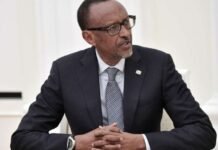PRESS RELEASE
Auditor General submits 2019 audit report to parliament
The Auditor General, Biraro R. Obadiah, has this Friday, May 15, 2020 submitted to parliament the audit report of the year 2019. In line with article 166 of the Rwandan constitution, the report was tabled before both chambers of parliament.
The report presents the AG’s findings and respective recommendations on matters which were identified during the execution of Financial, Compliance, Performance, IT and Special audits conducted during the period from May 2019 to April 2020.
The focus for the audits was on high risk entities and those that implement programs that are of national importance. Those include; 5 GBEs (RSSB, WASAC, BDF, SGF &RPC Ltd) and 10 boards. Other entities audited include; twenty eight (28) local governments, sixty nine (69) projects, eleven (11) ministries, nineteen (19) central government entities and twenty-six (26) district hospitals. In addition, as it has been before, OAG participated in the audit of EAC and its organs.
“This year, unqualified opinion makes 33% of opinion on the audit of compliance with laws and regulations and realization of value for money while 55% of opinions are unqualified on Financial Statements. The number of adverse opinions reduced by 3% and 5% compared to the last year in compliance and financial audit respectively. This indicates that public entities are improving towards a better audit opinions as qualified audit opinions increased by 3% compared to the last year” the Auditor General told parliament.
However, this improvement in better opinions is significantly dominated by projects and Ministries& other central government clusters which made up 82% of unqualified audit opinions and 67% of qualified audit opinions. Boards and GBEs results are still undesirable yet they are responsible for executing key national programs which significantly impact on the lives of citizens.
Entities audited represent 80% of the reported Government Expenditure for the year ended 30 June 2019 compared to the 86.6% audited last year. This decrease of audit coverage recorded this year was due to the COVID-19 pandemic that disrupted the availability of auditees. The audit of 9 entities that were still work in progress by the time of tabling the current annual audit report shall be concluded once the situation of COVID-19 pandemic will be stabilized.
In the current year, there has been a significant increase by 51% in irregular expenditure in form of unsupported expenditure, partially supported expenditure, wasteful expenditure, unauthorised expenditure and funds diverted or fraudulently utilised amounting. This year we have Frw 8.6 billion from Frw 5.6 billion in the year 2018.
Other cross cutting findings identified during audits include cases of delayed and abandoned contracts, continuing cases of idle assets; stalled projects. These problems, according to the AG, need adequate attention since they may threaten smooth implementation of National Strategy for Transformation (NST1).
The Auditor General also noted in his report that the level of implementation of his recommendations has deteriorated by 5% in the current audit. 44 % of recommendations were fully implemented compared to 49% implemented in the previous year 2018.
“With a continuing low rate of implementation of recommendations, I call upon public entities to recognize the audit reports as a management tool meant to enhance their improvement of PFM country system” The Auditor General pleaded.
“I recognize that the audit would be of little value if recommendations are not implemented to address issues highlighted in audit reports” he added.











